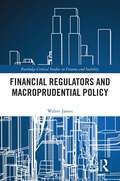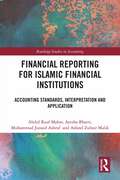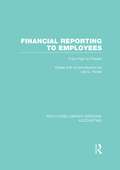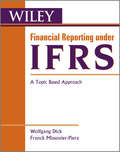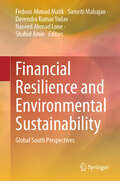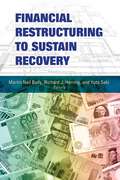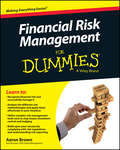- Table View
- List View
Financial Regulators and Macroprudential Policy (Routledge Critical Studies in Finance and Stability)
by Walter JamesThe 2008 global financial crisis was a rude awakening for financial regulators. In its wake, a novel approach called “macroprudential policy” became an important pillar of financial regulation to ensure the stability of the financial system. But in the decade after the crisis, financial regulators in different countries implemented macroprudential policies that varied widely in their stringency. This is a worrying gap since uneven regulation across borders and different financial sectors was a key driver of the 2008 crisis. What explains these cross‑country, cross‑sectoral, and temporal variations in macroprudential policy? This book answers this question through an in‑depth comparative historical analysis of the banking and asset management sectors in the United States and Japan. By comparing two sectors of the financial industry in two diverse economies, we can observe consistent dynamics in the politics of regulatory reform that illuminate the causes of different policy stringencies.The subject matter of this book will appeal to researchers and students of finance, financial regulation, political economy, and the politics of regulation. Its theoretical and methodological underpinnings will be of interest to scholars of comparative politics, comparative sociology, historical institutionalism, and those interested in interview‑based qualitative methods.
Financial Reporting Environment
by Paul M. Healy Robert S. Kaplan Krishna G. Palepu Amy P. HuttonProvides a framework for understanding the role of financial reporting and various intermediaries as mechanisms for reducing both adverse selection and moral hazard problems in capital markets. Financial reports reduce adverse selection by providing basic information for investors and their agents before they make initial capital resource allocation decisions. Subsequently, after capital is allocated to particular business ventures, financial reports reduce moral hazard between managers and investors by supplying information used in contracting between investors and managers to reduce conflicts of interests. Various institutional mechanisms and information intermediaries monitor and limit the manipulation of reported information by managers and constrain managers' ability to act in their own self-interest, rather than investors' interests. They also improve information production, reduce incentive conflicts, and enable capital markets to function effectively and efficiently, channeling the economy's savings to the most productive opportunities.
Financial Reporting Problems at Molex, Inc. (A)
by Paul M. HealyFollowing an accounting problem at Molex, the firm's auditors request changes in management. The board of directors has to decide whether the auditors' concerns have merit or whether, as management argues, the accounting issue is immaterial.
Financial Reporting at Mattel
by Julia Kelley Aiyesha Dey Marshal Herrmann Trung NguyenIn September 2020, Diana Ferguson, was nearing her first Audit Committee meeting as the newly appointed Audit Committee chair of Mattel, Inc. Mattel was just recovering from an accounting scandal which had revealed the company's poor internal controls and weak board oversight over financial reporting, and the committee had important decisions to make going forward. In early 2018, Mattel's Tax team had discovered a significant reporting error in its third-quarter financial results. In consultation with Mattel's independent auditor, PricewaterhouseCoopers (PwC), Mattel's finance team opted not to issue a correction and instead (effectively) concealed this mistake. This cover-up came to light in 2019, when an anonymous whistleblower reported the incident, setting off a chain of negative press coverage and senior-level resignations. Mattel responded by conducting an internal investigation, and concluded that, while their accounting processes needed to be improved, there was no evidence of fraud. Despite this, this issue had resurfaced in early 2020 when the United States Securities and Exchange Commission (SEC) launched a fresh investigation into the accounting error and subsequent cover-up. In light of these events, Ferguson and the Audit Committee faced a challenging road ahead with several important issues to consider. They needed to tackle Mattel's problematic governance and internal controls, and restore investor confidence in the company's financial disclosures. They also needed to review their earlier decision to continue to engage PwC as Mattel's auditor going forward.
Financial Reporting for Islamic Financial Institutions: Accounting and Auditing Standards, Interpretation and Application (Routledge Studies in Accounting)
by Ayesha Bhatti Abdul Rauf Mahar Muhammad Junaid Ashraf Asfand Zubair MalikMainstream accounting rules, namely International Financial Reporting Standards (IFRS), used in conventional banking, employ financial logics and principles which are at odds with Shariah and therefore unsuitable for reporting the results of Islamic banks. The book is an effort to explain the Islamic accounting principles and practices for Islamic Financial institutions and to juxtapose them to mainstream accounting principles in a simple and practical manner.The book begins with an overview of the Islamic Finance environment, the rationale for Islamic accounting and a brief introduction of AAOIFI (Accounting and Auditing Organization for Islamic Financial Institutions), the professional body responsible for the issuance of Islamic accounting standards. The main features of the AAOIFI Conceptual Framework and its comparison with IFRS framework are covered in Chapter 2. Chapters 3-9 cover the accounting treatment of the major Islamic finance products including trade-based (Murabaha, Salam and Istisna’a), rental-based (Ijarah) and risk-sharing based products (Mudarabah and Musharakah). Given the significance and complexity of Islamic bonds (Sukuk) for the Islamic finance industry, Chapter 10 discusses the basic accounting and reporting issues vis-à-vis Sukuk, leaving more complex issues for advanced texts on the topic. Zakah accounting (charity) and provisions and impairments are covered in Chapters 11 and 12.The chapters are arranged so that they start with a discussion of the product itself, followed by the AAOIFI accounting treatment and ending with the IFRS perspective. Each chapter begins with the learning objectives and a cover story and closes with a summary of the learning objectives. To facilitate the learning of readers, each chapter contains a glossary of the terms introduced as well as end of chapter multiple choice questions. In addition, each chapter includes practical insights and concept checks to enhance and test the understanding of the readers.This will be a useful guide for students, academics and practitioners concerned with the subject of financial reporting in Islamic Institutions.
Financial Reporting in India (Routledge Revivals)
by Claire MarstonFirst published in 1986, Financial Reporting in India provides a comprehensive review of Indian financial reporting and makes a comparison with the United Kingdom. The book compares and contrasts financial reporting practices in the United Kingdom and India by examining the influences on accounting practices in the two countries and by comparing the actual accounting practices and level of disclosure of information in financial reports. It concludes by providing information on the amount of influence exerted by the United Kingdom on Indian accounting practices. This book will be of interest to students and researchers of Asian studies and economics.
Financial Reporting in the UK: A History of the Accounting Standards Committee, 1969-1990 (Routledge Historical Perspectives in Accounting)
by B.A. RutherfordWritten by a well-known author, this book makes a major contribution to the history of financial reporting, exploring the current and international aspects of standard setting. Compiled through consultation of a considerable amount of relevant literature and interviews with a large number of key players of the ASC, it analyzes the big ‘set battles’ between standard setters and preparers of financial statements, over topics such as price change accounting, goodwill, and leasing and foreign currency translation, the stand-offs which delayed development in specific areas and the smaller skirmishes which impeded the work of improving financial reporting. It covers a range of topics, including: the formulation of standards on specific topics the evolution of the institutional machinery of standard-setting the politics of standard-setting the theory of accounting standardization the emergence of a conceptual framework for financial reporting. A fine account of the period following the 1960s, charting the history of the Accounting Standards Committee, this book is an essential resource for business and finance students.
Financial Reporting to Employees: From Past to Present (Routledge Library Editions: Accounting)
by Lee D. ParkerThis book introduces accountants and managers to an historical perspective of corporate financial reporting to employees. It presents a resource for research and practice based upon a literature that for its pre-1970 decades has been largely unfamiliar to contemporary educators, researchers and practitioners alike. In addition the pieces not only provide an historical view of issues and arguments, but of actual reporting practice and audience responses. For the students and researcher, these readings offer a first-hand glimpse into the intentions of employee report producers, the critiques of observers at the time, and the requirements of employees in some instances. For report producers, managers and accountants, it reveals some of the reporting traditions that we have inherited today as well as reporting practices that have already been recommended, tried and tested in the past. The readings selected cover a sixty year period from the 1920s through to the close of the 1970s, with the exception of the first contribution by Lewis, Parker and Sutcliffe (1984) that serves as the historical overview and analysis for the whole text.
Financial Reporting under IFRS
by Wolfgang Dick Franck Missonier-PieraThe International Financial Reporting Standards are quite different from other sets of accounting standards, and are fundamentally different from US-GAAP, in that they are based on principles, and not on detailed rules. Financial Reporting under IFRS:A topic-based approach offers a global perspective on IFRS by presenting the prescribed rationale and principles and illustrating them through numerous examples from large international companies. It aims to develop the fundamental skills necessary to read and use the information contained in all types of financial statements, through examples, activities, questions and answers.The book is broadly divided into three sections. Section one examines the structure of the Balance Sheet and the Income Statement, their links and the accounting mechanisms used to prepare them. Section two deals with the identification, evaluation and reporting of Balance Sheet items. Section three covers the use of financial statements to analyze a firm's performance and its risks. Throughout the book special topics are covered, including Derivatives and Hedge accounting (IAS 39), Business Combination (IFRS 3) and Operating Segments (IFRS 8).Financial Reporting under IFRS is ideally suited to the needs of students of accounting and financial reporting, but all users of financial statements, from creditors and investors to suppliers, customers, employees and governments will benefit from its concise, topic-based approach.
Financial Resilience and Environmental Sustainability: Global South Perspectives
by Shahid Amin Firdous Ahmad Malik Samriti Mahajan Devendra Kumar Yadav Naveed Ahmad LoneThis book offers a thorough examination of financial resilience and environmental sustainability, focusing on the financing of environmental sustainability, and addressing the issues, challenges, and opportunities of green financing alongside sustainable development. It presents global South perspectives on the critical issues of financing and environmental sustainability, providing policy recommendations for economies grappling with these paradoxical concerns. This book explores the challenges of financing and environmental sustainability through insights from various emerging economies. It combines theoretical, empirical, and model-based evidence to address the sustainability challenges faced by global economies, aligning with sustainable development goals. The book investigates climate change and environmental degradation challenges and examines economic strategies for a sustainable future. With over one billion people living below the poverty line, many lacking access to financial products and services, this book aims to present practical examples of financial inclusion, using the sustainable development goals as a framework. The book illustrates that comprehensive financial inclusion goes beyond credit access and bank account services, addressing the need for financially viable and accessible products and services that meet individuals' financial needs and vulnerabilities. It demonstrates how inclusive financial systems can empower those living in poverty globally, improving income levels, employment opportunities, livelihoods, and ultimately reducing poverty.
Financial Restructuring to Sustain Recovery
by Richard J. Herring Martin Neil Baily Yuta SekiHow much financial regulation will adequately reduce future systemic threats to the financial sector? To what extent can international authorities legally oversee the financial activities and outcomes of other transnational entities? Can macroprudential policy be aligned successfully with monetary policy to weather another boom-bust cycle? Editors Martin Neil Baily, Richard Herring, and Yuta Seki envision a global policy response to the financial crisis, designed to maintain sector-wide economic growth and improve profitability, rather than a response limited to secure only the strength of individual banks and nonbanks. This volume outlines how to manage factors that can endanger the financial system: how to prevent fluctuations in global capital flows; when to apply capital injection; and how to design incentives to avoid default on debt. Financial Restructuring to Sustain Recovery underscores the imperative of resolution procedures that reinforce sound financial governance, particularly in an effort to stave off future financial crises. Contributors include Kei Kodachi (Nomura Institute of Capital Markets Research), Franklin Allen (The Wharton School, University of Pennsylvania), James Barth (Auburn University College of Business; Milken Institute), Glenn Yago (Milken Institute), David Skeel (University of Pennsylvania Law School), Thomas Jackson (Simon School of Business, University of Rochester), Jay Ritter (Warrington College of Business, University of Florida).
Financial Restructuring to Sustain Recovery
by Richard J. Herring Martin Neil Baily Yuta SekiThe financial crisis of 2007-08 and the Great Recession caused more widespread economic trauma than any event since the Great Depression. With a slow and uneven recovery, encouraging stability and growth is critical. Financial Restructuring to Sustain Recovery maintains that while each part of the financial services industry can play a useful role in revving up the U.S. economic engine to full capacity, the necessary reforms are sometimes subtle and often difficult to implement. Editors Martin Neil Baily, Richard Herring, and Yuta Seki and their coauthors break recovery down by three areas:Restructuring the housing finance marketReforming the bankruptcy processReenergizing the market for initial public offeringsIncluded are lessons drawn from Japan's experience in overcoming its long-lasting financial crisis after the collapse of its real estate market in the 1990s.Contributors: Franklin Allen (Wharton School, University of Pennsylvania), James R. Barth (Auburn University College of Business; Milken Institute), Thomas Jackson (Simon School of Business, University of Rochester), Jay R. Ritter (Warrington College of Business, University of Florida), David Skeel (University of Pennsylvania Law School), and Glenn Yago (Milken Institute).
Financial Risk Forecasting: The Theory and Practice of Forecasting Market Risk with Implementation in R and Matlab
by Jon DanielssonFinancial Risk Forecasting is a complete introduction to practical quantitative risk management, with a focus on market risk. Derived from the authors teaching notes and years spent training practitioners in risk management techniques, it brings together the three key disciplines of finance, statistics and modeling (programming), to provide a thorough grounding in risk management techniques. Written by renowned risk expert Jon Danielsson, the book begins with an introduction to financial markets and market prices, volatility clusters, fat tails and nonlinear dependence. It then goes on to present volatility forecasting with both univatiate and multivatiate methods, discussing the various methods used by industry, with a special focus on the GARCH family of models. The evaluation of the quality of forecasts is discussed in detail. Next, the main concepts in risk and models to forecast risk are discussed, especially volatility, value-at-risk and expected shortfall. The focus is both on risk in basic assets such as stocks and foreign exchange, but also calculations of risk in bonds and options, with analytical methods such as delta-normal VaR and duration-normal VaR and Monte Carlo simulation. The book then moves on to the evaluation of risk models with methods like backtesting, followed by a discussion on stress testing. The book concludes by focussing on the forecasting of risk in very large and uncommon events with extreme value theory and considering the underlying assumptions behind almost every risk model in practical use - that risk is exogenous - and what happens when those assumptions are violated. Every method presented brings together theoretical discussion and derivation of key equations and a discussion of issues in practical implementation. Each method is implemented in both MATLAB and R, two of the most commonly used mathematical programming languages for risk forecasting with which the reader can implement the models illustrated in the book. The book includes four appendices. The first introduces basic concepts in statistics and financial time series referred to throughout the book. The second and third introduce R and MATLAB, providing a discussion of the basic implementation of the software packages. And the final looks at the concept of maximum likelihood, especially issues in implementation and testing. The book is accompanied by a website - www.financialriskforecasting.com - which features downloadable code as used in the book.
Financial Risk Management
by Allan M. MalzFinancial risk has become a focus of financial and nonfinancial firms, individuals, and policy makers. But the study of risk remains a relatively new discipline in finance and continues to be refined. The financial market crisis that began in 2007 has highlighted the challenges of managing financial risk. Now, in Financial Risk Management, author Allan Malz addresses the essential issues surrounding this discipline, sharing his extensive career experiences as a risk researcher, risk manager, and central banker. The book includes standard risk measurement models as well as alternative models that address options, structured credit risks, and the real-world complexities or risk modeling, and provides the institutional and historical background on financial innovation, liquidity, leverage, and financial crises that is crucial to practitioners and students of finance for understanding the world today.Financial Risk Management is equally suitable for firm risk managers, economists, and policy makers seeking grounding in the subject. This timely guide skillfully surveys the landscape of financial risk and the financial developments of recent decades that culminated in the crisis. The book provides a comprehensive overview of the different types of financial risk we face, as well as the techniques used to measure and manage them. Topics covered include:Market risk, from Value-at-Risk (VaR) to risk models for optionsCredit risk, from portfolio credit risk to structured credit productsModel risk and validationRisk capital and stress testingLiquidity risk, leverage, systemic risk, and the forms they takeFinancial crises, historical and current, their causes and characteristicsFinancial regulation and its evolution in the wake of the global crisisAnd much moreCombining the more model-oriented approach of risk management-as it has evolved over the past two decades-with an economist's approach to the same issues, Financial Risk Management is the essential guide to the subject for today's complex world.
Financial Risk Management
by Francisco Javier Población GarcíaThis book provides a quantitative overview of corporate risk management for both financial and non-financial organisations. It systematically explores a range of important risks, including interest rate risk, equity risk, commodity price risk, credit risk management, counterparty risk, operational risk, liquidity risk, market risk, derivative credit risk and country risk. Chapters also provide comprehensive and accessible analysis of risk-related phenomena and the corporate strategies employed to minimise the impacts of risk in each case. Chapters begin with an explanation of basic concepts and terminology, before going on to present quantitative examples and qualitative discussion sections. The author leverages his lifetime’s experience of working in risk management to offer this clear and empirical guide for scholars and practitioners researching financial stability.
Financial Risk Management
by Wei Chen Jimmy SkoglundA global banking risk management guide geared toward the practitioner Financial Risk Management presents an in-depth look at banking risk on a global scale, including comprehensive examination of the U. S. Comprehensive Capital Analysis and Review, and the European Banking Authority stress tests. Written by the leaders of global banking risk products and management at SAS, this book provides the most up-to-date information and expert insight into real risk management. The discussion begins with an overview of methods for computing and managing a variety of risk, then moves into a review of the economic foundation of modern risk management and the growing importance of model risk management. Market risk, portfolio credit risk, counterparty credit risk, liquidity risk, profitability analysis, stress testing, and others are dissected and examined, arming you with the strategies you need to construct a robust risk management system. The book takes readers through a journey from basic market risk analysis to major recent advances in all financial risk disciplines seen in the banking industry. The quantitative methodologies are developed with ample business case discussions and examples illustrating how they are used in practice. Chapters devoted to firmwide risk and stress testing cross reference the different methodologies developed for the specific risk areas and explain how they work together at firmwide level. Since risk regulations have driven a lot of the recent practices, the book also relates to the current global regulations in the financial risk areas. Risk management is one of the fastest growing segments of the banking industry, fueled by banks' fundamental intermediary role in the global economy and the industry's profit-driven increase in risk-seeking behavior. This book is the product of the authors' experience in developing and implementing risk analytics in banks around the globe, giving you a comprehensive, quantitative-oriented risk management guide specifically for the practitioner. Compute and manage market, credit, asset, and liability risk Perform macroeconomic stress testing and act on the results Get up to date on regulatory practices and model risk management Examine the structure and construction of financial risk systems Delve into funds transfer pricing, profitability analysis, and more Quantitative capability is increasing with lightning speed, both methodologically and technologically. Risk professionals must keep pace with the changes, and exploit every tool at their disposal. Financial Risk Management is the practitioner's guide to anticipating, mitigating, and preventing risk in the modern banking industry.
Financial Risk Management
by Steven AllenA top risk management practitioner addresses the essential aspects of modern financial risk management In the Second Edition of Financial Risk Management + Website, market risk expert Steve Allen offers an insider's view of this discipline and covers the strategies, principles, and measurement techniques necessary to manage and measure financial risk. Fully revised to reflect today's dynamic environment and the lessons to be learned from the 2008 global financial crisis, this reliable resource provides a comprehensive overview of the entire field of risk management. Allen explores real-world issues such as proper mark-to-market valuation of trading positions and determination of needed reserves against valuation uncertainty, the structuring of limits to control risk taking, and a review of mathematical models and how they can contribute to risk control. Along the way, he shares valuable lessons that will help to develop an intuitive feel for market risk measurement and reporting. Presents key insights on how risks can be isolated, quantified, and managed from a top risk management practitioner Offers up-to-date examples of managing market and credit risk Provides an overview and comparison of the various derivative instruments and their use in risk hedging Companion Website contains supplementary materials that allow you to continue to learn in a hands-on fashion long after closing the book Focusing on the management of those risks that can be successfully quantified, the Second Edition of Financial Risk Management + Websiteis the definitive source for managing market and credit risk.
Financial Risk Management (Wiley Global Finance Executive Select #178)
by Frank J. FabozziCreated by the experienced author team of Frank Fabozzi and Pamela Peterson Drake, Financial Risk Management examines the essential elements of this discipline and makes them accessible to a wide array of readers-from seasoned veterans looking for a review to newcomers needing to get their footing in finance. Financial risk is the exposure of a corporation to an event that can cause a shortfall in a targeted financial measure or value and includes market risk, credit risk, market liquidity risk, operational risk, and legal risk. This material discusses the four key processes in financial risk management: risk identification, risk assessment, risk mitigation, and risk transferring. The process of risk management involves determining which risks to accept, which to neutralize, and which to transfer.
Financial Risk Management For Dummies
by Aaron BrownTake the risk out of financial risk management Written by bestselling author and past winner of the GARP Award's Risk Manager of the Year, Aaron Brown, Financial Risk Management For Dummies offers thorough and accessible guidance on successfully managing and controlling financial risk within your company. Through easy-to-follow instruction, you'll find out how to manage risk, firstly by understanding it, and then by taking control of it. Plus, you'll discover how to measure and value financial risk, set limits, stop losses, control drawdowns and hedge bets. Financial risk management uses financial instruments to manage exposure to risk within firms, large and small—particularly credit risk and market risk. From managing and measuring risk to working in financial institutions and knowing how to communicate risk to your company and clients, Financial Risk Management For Dummies makes it easy to make sense of the management of risk when working in various different financial institutions and concludes by covering the topic of how to communicate risk — how to report it properly and how to deal with and comply with all of the regulations. Covers managing risk and working as a financial risk manager Provides everything you need to know about measuring financial risk Walks you through working in financial institutions Demonstrates how to communicate risk If you work in the financial sector and want to make financial risk management your mission, you've come to the right place!
Financial Risk Management and Climate Change Risk: The Experience in a Central Bank (Contributions to Finance and Accounting)
by Antonio ScaliaFinancial risk management for institutional investors has recently grown in scope to include long-term sustainability considerations and climate change risk concerns. This book shows how a national central bank in the Eurosystem has adapted its financial risk management principles and practices against the background of non-conventional monetary policy measures and following the introduction of sustainability criteria, with a special role for carbon-neutrality. The topics covered include a market-based approach to evaluating credit risk, the development of an independent credit rating system, and the properties and limitations of agencies’ sovereign ratings. Furthermore, the book analyzes the integration of sustainability principles into strategic asset allocation and describes the use of machine learning techniques for discerning the role of the E, S and G variables in equity returns. The authors also discuss the growth of the global green bond market and the greenium, as well as the sustainability indicators for large portfolios of corporate and government securities. Given its scope, the book will appeal to all professionals working in the field who would like to know the state-of-the-art in these areas.
Financial Risk Management and Derivative Instruments (Routledge Advanced Texts in Economics and Finance)
by Michael DempseyFinancial Risk Management and Derivative Instruments offers an introduction to the riskiness of stock markets and the application of derivative instruments in managing exposure to such risk. Structured in two parts, the first part offers an introduction to stock market and bond market risk as encountered by investors seeking investment growth. The second part of the text introduces the financial derivative instruments that provide for either a reduced exposure (hedging) or an increased exposure (speculation) to market risk. The fundamental aspects of the futures and options derivative markets and the tools of the Black-Scholes model are examined. The text sets the topics in their global context, referencing financial shocks such as Brexit and the Covid-19 pandemic. An accessible writing style is supported by pedagogical features such as key insights boxes, progressive illustrative examples and end-of-chapter tutorials. The book is supplemented by PowerPoint slides designed to assist presentation of the text material as well as providing a coherent summary of the lectures. This textbook provides an ideal text for introductory courses to derivative instruments and financial risk management for either undergraduate, masters or MBA students.
Financial Risk Management and Modeling (Risk, Systems and Decisions)
by Constantin Zopounidis Ramzi Benkraiem Iordanis KalaitzoglouRisk is the main source of uncertainty for investors, debtholders, corporate managers and other stakeholders. For all these actors, it is vital to focus on identifying and managing risk before making decisions. The success of their businesses depends on the relevance of their decisions and consequently, on their ability to manage and deal with the different types of risk. Accordingly, the main objective of this book is to promote scientific research in the different areas of risk management, aiming at being transversal and dealing with different aspects of risk management related to corporate finance as well as market finance. Thus, this book should provide useful insights for academics as well as professionals to better understand and assess the different types of risk.
Financial Risk Management for Cryptocurrencies (SpringerBriefs in Finance)
by Wim Schoutens Lucia Alessi Eline Van der Auwera Marco Petracco GiudiciThis book explores the emerging field of risk management and risk analysis of cryptocurrencies, an area that has been generating considerable research. It begins by providing an introduction to digital finance and the concept of cryptocurrencies and blockchain technologies. It then describes in detail the intrinsic risks involved in cryptocurrencies, an area that, to date, has not been fully documented or investigated. Lastly, it discusses the various types of risk, with a focus on design, operational, market and quantitative risks.Providing insights into the analysis and management of cryptocurrencies, and serving as a starting point for a more in-depth risk analysis, this book will appeal to professionals and researchers interested in familiarizing themselves with the risks in cryptocurrencies, including academics, portfolio managers, risk-managers, quants, financial professionals, regulators, economists, asset managers and traders.
